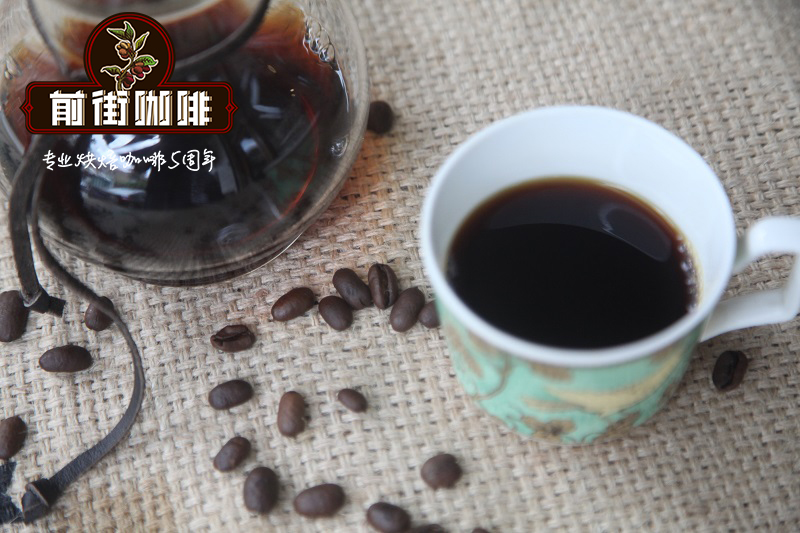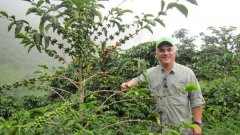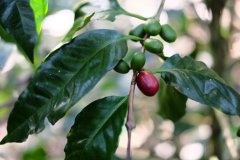To what extent will the thickness of coffee powder affect coffee brewing?
Professional coffee knowledge exchange more coffee bean information please follow the coffee workshop (Wechat official account cafe_style)

A very important factor in the failure of extraction is the mismatch between the grinding thickness of coffee and the time and mode of extraction. The grinding thickness of coffee can expose all volatile aromatic substances in coffee beans. The grinding thickness will have a great effect on the extraction of your coffee.
Although you only need to throw the roasted coffee beans into the water, the coffee begins to be extracted, which takes a long time. However, as we grind the coffee particles finer, the surface area of the coffee particles will double, and the larger the contact area with water, the corresponding extraction rate will increase.
What Affects The Ideal Grind Size?
What is affecting the grinding of coffee?
First of all, personal preference always determines the ideal coffee extraction scheme. Therefore, according to the origin, variety, treatment and baking characteristics of coffee, we may want to highlight their different characteristics when brewing coffee. For example, deep-roasted coffee beans have a higher rate of dissolution, so when it comes to deep-roasted coffee beans, we need to use a thicker grinding. However, the grinding of coffee is not only determined by a bit of roasting, there are two points worth mentioning.
The first is the extraction method: different extraction methods need to match different grinding. Fine grinding of coffee particles may lead to over-extraction of coffee, leading us to the next important factor in coffee extraction-time. Large particles of coffee powder release flavor more slowly, while smaller particles release flavor faster. For example, when making coffee in a French kettle, long-time soaking and extraction requires coarse coffee powder for extraction; most follicular coffee uses medium-fine grinding particles; and when using a coffee mechanism for espresso or making Turkish coffee, very fine ground coffee particles are needed to make ultra-strong coffee because of the use of special coffee utensils.
The second point is the freshness of coffee beans. With the passage of time, the longer the storage time of coffee cooked beans, the taste of coffee will change with the passage of time, so the extraction scheme should be adjusted accordingly. In this case, some people like to grind it more finely, while others will increase the amount of powder and adjust it according to the thicker grinding. The former will increase the extraction rate of coffee, while the latter is related to the strength of coffee.
Increase the number of particles and extraction will exponentially increase
Increase the number of coffee particles and correspondingly multiply the extraction of coffee.
The percentage of soluble matter in coffee particles is related to the surface area of coffee powder and water contact. Finer grinding has more coffee particles, which will bring the surface area in contact with water and improve the extraction rate. However, not all flavor compounds are pleasant, so higher extraction rates are not always ideal, and flavors we don't like dissolve the slowest. Therefore, we need to pay attention to controlling the solubility of coffee by grinding scale.
The Coffee Grind Consistency Issue
The problem of consistency of coffee powder
In the extraction of coffee, uniform grinding is very important to avoid uneven extraction caused by the non-uniform extraction time.
In addition, no matter what grinder you use, inconsistency can be a problem. If the ground coffee powder is a mixture of coarse powder and fine powder, the coffee powder will be extracted at different rates. Usually, when the larger particles are extracted just right, the smaller particles will have been overextracted. This will cause us to be unable to predict the extraction rate of coffee, make the flavor of coffee worse, affect the consistency of coffee extraction and so on. In order to solve this problem, most coffee lovers choose high-quality grinders.
A very important factor in the failure of extraction is the mismatch between the grinding thickness of coffee and the time and mode of extraction. The grinding thickness of coffee can expose all volatile aromatic substances in coffee beans. The grinding thickness will have a great effect on the extraction of your coffee.
Although you only need to throw the roasted coffee beans into the water, the coffee begins to be extracted, which takes a long time. However, as we grind the coffee particles finer, the surface area of the coffee particles will double, and the larger the contact area with water, the corresponding extraction rate will increase.
What Affects The Ideal Grind Size?
What is affecting the grinding of coffee?
First of all, personal preference always determines the ideal coffee extraction scheme. Therefore, according to the origin, variety, treatment and baking characteristics of coffee, we may want to highlight their different characteristics when brewing coffee. For example, deep-roasted coffee beans have a higher rate of dissolution, so when it comes to deep-roasted coffee beans, we need to use a thicker grinding. However, the grinding of coffee is not only determined by a bit of roasting, there are two points worth mentioning.
The first is the extraction method: different extraction methods need to match different grinding. Fine grinding of coffee particles may lead to over-extraction of coffee, leading us to the next important factor in coffee extraction-time. Large particles of coffee powder release flavor more slowly, while smaller particles release flavor faster. For example, when making coffee in a French kettle, long-time soaking and extraction requires coarse coffee powder for extraction; most follicular coffee uses medium-fine grinding particles; and when using a coffee mechanism for espresso or making Turkish coffee, very fine ground coffee particles are needed to make ultra-strong coffee because of the use of special coffee utensils.
The second point is the freshness of coffee beans. With the passage of time, the longer the storage time of coffee cooked beans, the taste of coffee will change with the passage of time, so the extraction scheme should be adjusted accordingly. In this case, some people like to grind it more finely, while others will increase the amount of powder and adjust it according to the thicker grinding. The former will increase the extraction rate of coffee, while the latter is related to the strength of coffee.
Increase the number of particles and extraction will exponentially increase
Increase the number of coffee particles and correspondingly multiply the extraction of coffee.
The percentage of soluble matter in coffee particles is related to the surface area of coffee powder and water contact. Finer grinding has more coffee particles, which will bring the surface area in contact with water and improve the extraction rate. However, not all flavor compounds are pleasant, so higher extraction rates are not always ideal, and flavors we don't like dissolve the slowest. Therefore, we need to pay attention to controlling the solubility of coffee by grinding scale.
The Coffee Grind Consistency Issue
The problem of consistency of coffee powder
In the extraction of coffee, uniform grinding is very important to avoid uneven extraction caused by the non-uniform extraction time.
In addition, no matter what grinder you use, inconsistency can be a problem. If the ground coffee powder is a mixture of coarse powder and fine powder, the coffee powder will be extracted at different rates. Usually, when the larger particles are extracted just right, the smaller particles will have been overextracted. This will cause us to be unable to predict the extraction rate of coffee, make the flavor of coffee worse, affect the consistency of coffee extraction and so on. In order to solve this problem, most coffee lovers choose high-quality round knife grinders.
Important Notice :
前街咖啡 FrontStreet Coffee has moved to new addredd:
FrontStreet Coffee Address: 315,Donghua East Road,GuangZhou
Tel:020 38364473
- Prev

Espresso powder brand recommended _ that brand of espresso tastes good
Professional coffee knowledge exchange more coffee bean information please follow the coffee workshop (Wechat official account cafe_style) traditional espresso when the Italians made coffee a hundred years ago, the coffee machine design was not very good (compared to today), but also often made a "shit", the production speed is not very fast, the coffee may be very bitter, but also very charred, extraction
- Next

What are the better coffee brands? 2019 ranking of Chinese coffee chain brands
Professional coffee knowledge exchange more coffee bean information Please pay attention to the coffee workshop (Wechat official account cafe_style) consumption experience since we have chosen takeout, in addition to the quality of the coffee itself, the experience from placing an order to drinking to drinking is equally important, is it convenient and fast? Is it beautiful? Is it good value for money? Is the key to consider when ordering takeout. Moreover, the time of transportation,
Related
- Beginners will see the "Coffee pull flower" guide!
- What is the difference between ice blog purified milk and ordinary milk coffee?
- Why is the Philippines the largest producer of crops in Liberia?
- For coffee extraction, should the fine powder be retained?
- How does extracted espresso fill pressed powder? How much strength does it take to press the powder?
- How to make jasmine cold extract coffee? Is the jasmine + latte good?
- Will this little toy really make the coffee taste better? How does Lily Drip affect coffee extraction?
- Will the action of slapping the filter cup also affect coffee extraction?
- What's the difference between powder-to-water ratio and powder-to-liquid ratio?
- What is the Ethiopian local species? What does it have to do with Heirloom native species?

